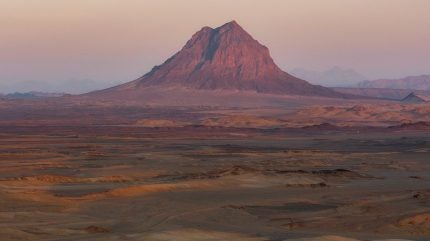
The Reko Diq gold and copper mine in Pakistan has reached levels of progress as yet unseen in the project’s decades long history.
On 8 April, the mine’s updated feasibility study and conditional related phase one development capital was approved.
Following this breakthrough, Reko Diq project manager Tim Cribb spoke to Mining Technology from the Pakistan Minerals Investment Forum (PMIF) about the next steps for the mine.
“The good thing about the project is that we have buy-in at the federal as well as the provincial level. Now that the feasibility study is complete, we have a pathway forward and can focus on the delivery of the construction and mobilising people,” he said.
Currently, the mine is jointly owned by Canadian miner Barrick Gold (50%), the Pakistan Government (25%) and the Government of Balochistan (25%).
Saudi Arabian mining fund Manara Minerals is also set to purchase a 10–20% stake valued at between $500m (SR1.88bn) and $1bn from the Pakistan Government.

US Tariffs are shifting - will you react or anticipate?
Don’t let policy changes catch you off guard. Stay proactive with real-time data and expert analysis.
By GlobalDataThe phase one approval for Reko Diq is contingent on limited recourse project financing of $3bn (C$4.26bn). If this is secured, works can commence in 2025 in line with the target for first production by the end of 2028.
In addition, the World Bank’s private investment arm, the International Finance Corporation, is providing $300m in debt financing for the mine.
According to the latest feasibility study, Reko Diq is estimated to contain 15 million tonnes of proven and probable copper reserves, as well as 26 million ounces of gold. The project will comprise two open-pit mines and a processing plant, operating over an estimated 37-year life of mine.
The mill is expected to process 45 million tonnes per annum (mtpa) of ore from 2028, expanding to 90mtpa in phase two, planned from 2034.
Cribb confirmed that recent progress has been exciting, but there is still much work to be done before Reko Diq can deliver on its full potential.
Constructing Reko Diq
A range of mining services and equipment providers have secured contracts for work on Reko Diq. On 3 April, a deal was announced with mining services company Capital for early civil works and the construction and maintenance of a tailings storage facility.
Following this, during the PMIF, Fluor Corporation was announced as the lead engineering, procurement and construction management partner.
“A lot of construction work occurs internationally, off site, as the equipment is manufactured,” explained Cribb. “In 2026, much of that equipment will start arriving at site – so preparations for large transport and logistics work is ongoing,” he added.
Other processing and mining equipment providers to the project include industry heavyweights such as Metso, Weir, Komatsu and Caterpillar.
“You always need to bring in international expertise when you start off in new regions,” said Cribb. “Large-scale mining equipment is not available in the local market, so part of the challenge has been bringing key suppliers into Pakistan.”
As for the integration of technological advancement such as automation and AI into the mine once it is operational, Cribb has a balanced outlook as project manager.
“There is obviously risk in big projects,” Cribb said. “We want to minimise that by ensuring that everything we do is tried and tested before building them into Reko Diq, but we also want to leave opportunities open for automation or battery technology and the like.
“We have kept that as the thesis for the work to realise efficiency and cost-benefits,” he added.
Reko Diq’s role in Pakistan’s mining landscape
As demand for critical minerals skyrockets, global attention is increasingly turning towards Pakistan’s relatively untapped reserves of 92 total discovered minerals.
Critical minerals were reportedly a key topic of discussion between US Secretary of State Marco Rubio and Pakistani Foreign Minister Ishaq Dar in a meeting on 7 April.
The Reko Diq project has a significant role to play in this upward trajectory, being situated in the world-renowned Tethyan copper belt near Pakistan’s borders with Iran and Afghanistan.
Cribb confirmed that despite the instabilities of the region, the site itself is “relatively peaceful”.
Barrick Gold has established social development and training programmes for the local community and employees, with the aim of building a domestic workforce of 4,000 long-term workers that are skilled in operating mining equipment. The project workforce could peak at 7,500 during construction.
The project is also expected to produce $74bn in free cash flow over the next 37 years, according to Barrick Gold CEO Mark Bristow.
Barrick Gold’s commitment to Reko Diq’s potential is such that chairman John Thornton cited the project in a proposal to rebrand the company to Barrick Mining to reflect its push into copper operations.
Cribb told Mining Technology that the scale of Reko Diq will “break down barriers in Pakistan’s mining supply chain, especially for future exploration and deposits”.
“There is so much potential in Pakistan and we are looking at other exploration opportunities,” he concluded.



